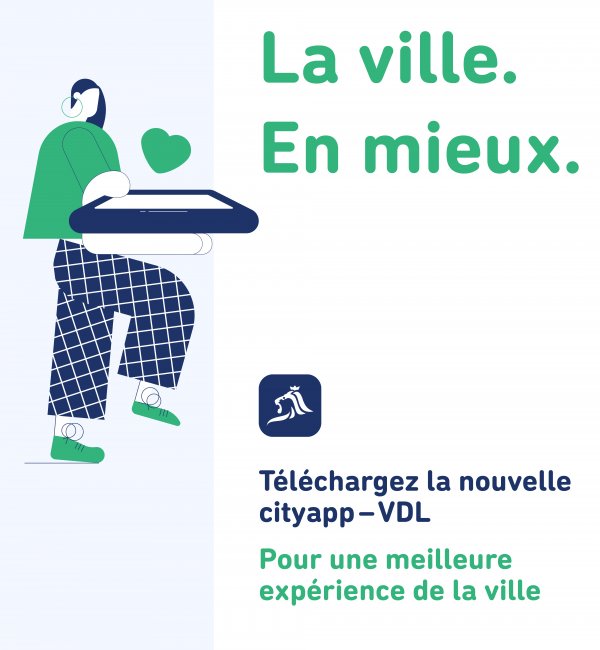Summary record
Video
Relocation of the "Am Haff" bistrot social further to the renovation of the Cinémathèque
QUESTION POSED BY ANA CORREIA DA VEIGA
My question concerns the relocation of the "Am Haff" bistrot social further to the renovation of the Cinémathèque. During the budgetary debate and discussion of the multi-year plan, the municipal council was told that the Cinémathèque was slated to be renovated and that this undertaking would include archaeological excavations. What are the implications of this project for the "Am Haff" bistrot social? When will it need to move? What will be its new location? Have plans already been made? Will the new location be permanent?
RESPONSE PROVIDED BY ALDERMAN MAURICE BAUER
The bistrot social is very successful and serves an important function as it provides homeless people with a place off the streets where they can go and rest. It will remain in its current location until 2023. It will then be relocated when the extension and renovation works on the Cinémathèque begin. The matter of potential archaeological excavations depends on the outcome of the surveys currently being conducted by the relevant national department. So far no decision on the new location of the bistrot social has been taken, but it will definitely remain in the city centre.
Resource centre and drop-off and pick-up of second-hand items
QUESTION POSED BY LINDA GAASCH
In light of the overuse of resources across the globe in general, and in Luxembourg in particular, it is important to offer alternatives to people who would like to give a new life to items they no longer use rather than throw them away. The conversion of the sorting centre into a resource centre with, notably, the option to drop off and pick up second-hand items that are in good condition has been addressed at several municipal council meetings. It is unfortunate that the "item drop-off" area of the Recycling Centre was closed to comply with measures implemented to stem the spread of COVID-19, even though this step was not taken in other municipalities. In 2020 in Kehlen, 46 tonnes' worth of items were claimed by new owners. Is the second-hand area of the City's sorting centre still closed? Is it expected to reopen? How many tonnes of items per year could potentially be reused thanks to the implementation of this system? What are the plans to improve this system in the short, medium and long terms? When does the City anticipate making these improvements?
RESPONSE PROVIDED BY ALDERMAN PATRICK GOLDSCHMIDT
The second-hand area of the City's sorting centre has been closed since early 2020 – that is, since the beginning of the pandemic. The City is currently examining the conditions in which it could be reopened. Current public health protocols limit the number of people who can be in the Recycling Centre. The current site is not suitable. A more suitable site will be created in the new resource centre, which will also offer a repair service. As a general rule, the City encourages residents to reuse items rather than dispose of them.
Employment of non-Luxembourg nationals by the City of Luxembourg
QUESTION POSED BY GUY FOETZ
Luxembourg City is a cosmopolitan place where 70% of residents are not Luxembourgish. The employment of non-Luxembourg nationals in the public administrations is a testament to the city's openness and level of integration. Any European national who enjoys civil and political rights is eligible for public jobs, unless these jobs entail direct or indirect involvement in exercising public authority. Individuals need only speak the three official languages – French, German and Luxembourgish – and there is no minimum residency requirement. Do non-Luxembourgish candidates apply for City jobs? What eligibility issues have arisen in the last few years? How many non-Luxembourg nationals are currently employed by the City? What is their status, and in which departments do they work?
RESPONSE PROVIDED BY THE MAYOR, LYDIE POLFER
In 2020, 1,879 applications were received for 94 advertised jobs. There were 555 applications from non-Luxembourgish candidates. Of those, 68 were disqualified because they were nationals of non-EU countries. Candidates who are EU nationals and speak the country's three administrative languages – Luxembourgish, French and German – are eligible for these jobs. At the municipality level, there are very few positions for which Luxembourgish nationality is essential – namely, secretary general, deputy secretary general, tax collector and field warden. The City currently employs 4,305 people, of whom 3,662 are Luxembourg nationals and 643 are foreign nationals – including, for example, 125 Portuguese nationals, around 100 German nationals, 58 French nationals, as well as Belgian and Cape Verdean nationals. The foreign nationals work for many municipal departments, including the Service Architecte-Maintenance (Architecture and Maintenance Department), crèches, childcare centres, the Conservatoire, museums, swimming pools, theatre, etc.
vel'OH! stations
QUESTION POSED BY CLAUDIE REYLAND
I would like to commend the installation of a new vel'OH! station near the new sports complex in Cents. It is challenging for cyclists to ride from Stadtgrund to Cents – even on an e-bike, and not just in hot weather. It is very dangerous for cyclists to ride next to rushed, stressed motorists. Separate bicycle lanes need to be opened, and the bike and pedestrian bridge with the elevator, which will connect the Cents, Neudorf and Weimershof districts, must be completed as soon as possible. On 15 September 2020, the déi gréng group asked a question about installing additional vel'OH! stations in Neudorf, Weimershof, Dommeldange and Beggen, and about extending the vel'OH! system to the municipality of Walferdange. Will the system in fact be extended? If so, when? Have there been a lot of complaints about the condition of the rental e-bikes? Does JCDecaux carry out appropriate maintenance on these bikes?
RESPONSE PROVIDED BY ALDERMAN PATRICK GOLDSCHMIDT
There are plans to install a vel'OH! station after the completion of the Cents-Neudorf-Weimershof bike and pedestrian bridge. As regards the districts of Dommeldange and Beggen and the municipality of Walferdange, in the medium term the City plans to install a vel'OH! station near the Dommeldange train station. We need to bear in mind that the City is dependent on the completion of the Nennig special development plan (plan d'aménagement particulier – PAP) and the works that will be carried out by the National Roads Administration (Administration des Ponts et Chaussées) on the national cycle path, which will begin this year. An extension of the vel'OH! system to the municipality of Walferdange is also planned. It is also important to note that the vel'OH! stations should not be too far apart so that bikes can be easily picked up and returned. The system is popular, especially among young people. In 2020, the City served JCDecaux with a new formal notice, and since then the City has received fewer complaints about the condition of the bikes.
Award criteria for social housing
QUESTION POSED BY CHRISTA BRÖMMEL
The City is continuing its efforts to help low-income people access municipal social housing. Work on several municipal housing units was recently completed. Demand for social and affordable housing far exceeds the City's supply, and there are waiting lists. The heritage committee and social commission will be examining the new housing award criteria during a joint meeting. How are the criteria set forth in the amended Grand Ducal Regulation of 16 November 1998 establishing implementing measures relating to rental housing, building subsidies and properties transferred on the basis of a perpetual lease and surface rights (Règlement grand-ducal fixant les mesures d'exécution relatives aux logements locatifs, aux aides à la pierre ainsi qu'aux immeubles cédés sur la base d'un droit d'emphytéose et d'un droit de superficie), which are stipulated in the amended law of 25 February 1979 on housing assistance (loi modifiée du 25 février 1979 concernant l’aide au logement), applied? What additional criteria determine the allocation of social housing? Are these criteria published? If not, why not? Are applicants informed of these criteria when they submit their application file? What is the specific procedure for allocating social housing? Who takes the final decision?
RESPONSE PROVIDED BY ALDERMAN MAURICE BAUER
People can apply for social housing by completing and submitting the application form available on the City's website. Once an applicant has submitted all the required certificates, a social enquiry is conducted at the applicant's residence. When the application has been reviewed and the social enquiry completed, the applicant will receive an acknowledgement of receipt confirming their registration on the waiting list. Every year, a letter is sent to all applicants inviting them to update their application, because people often submit applications not only to the City but also to the Housing Fund (Fonds pour le développement du logement et de l'habitat), the Société nationale des habitations à bon marché (SNHBM) and the Social Housing Agency (Agence immobilière sociale – AIS). Anyone who does not update their application within one month, with no valid reason for failing to do so, is removed from the waiting list. Applicants are notified of this removal by post. The conditions of eligibility are determined by law. Article 4 of the aforementioned Grand Ducal Regulation of 16 November 1998 stipulates that only households that are neither the owner, nor the usufructuary, nor the perpetual leaseholder of a dwelling, and who do not enjoy any right of residence in another dwelling, are eligible. The order of priority is assigned to households based on their financial position, social and family situation, and the sanitary conditions of their current housing. In accordance with Article 10 of the aforementioned regulation, the order of priority is as follows: 1. a) expropriation procedure in the public interest; b) eviction ruling, when the household was in good faith; c) closure of unsanitary housing by municipal decree; 2. A household that occupies housing that does not have a shower or bathroom; 3. A household that occupies housing that is not suitable for the composition of the household; 4. A household that occupies housing whose hygiene, liveability or safety has been impaired; 5. A household that occupies housing for which the monthly rent is higher than thirty percent of the household's monthly net disposable income. Article 13 of the aforementioned regulation stipulates that only households that have resided in the municipality for at least three years, and households in which at least one member exercises their professional activity in the municipality, meet the conditions of eligibility. Social housing is allocated through a decision by the college of aldermen on the recommendation of the Service Logement (Housing Department), in accordance with the Grand Ducal Regulation of 16 November 1998.
MAYOR LYDIE POLFER
The college of aldermen always upholds the Service Logement's recommendations on which applications to grant.












